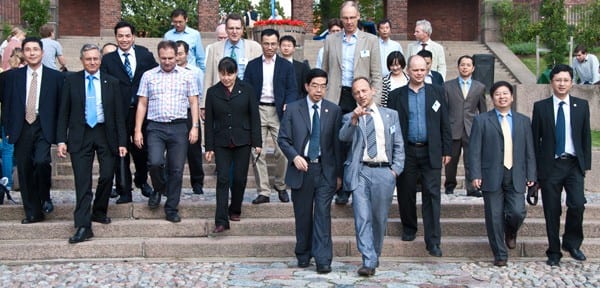A signing ceremony marking the official start of a far-reaching new collaboration in biomedicine and biotechnology research and education was the highlight of a visit to Sweden’s KTH Royal Institute of Technology by a 14-member delegation from China’s Shanghai Jiaotong University (SJTU) on August 17. The exchange also included two days of discussions on the next phase of the relationship, where energy and materials research will be in focus.
“SJTU is China’s top university for medical education, and it attracts the very best students in a country that’s making enormous investments in health and medicine,” said Professor Wouter van der Wijngaart, director of KTH’s Life Science Technologies Research Platform.

A delegation from Shanghai Jiaotong University tours the KTH campus. In the foreground, SJTU Vice President Huang Zhen talks with Professor Ramon Wyss, Vice President for International Affairs.
“The university has links to all the major hospitals in the region, with access to at least 20,000 patient beds. This is crucially important in gaining access to clinical samples for the types of studies we’re doing here in Stockholm, where KTH and Karolinska Institute already work closely together. This agreement means that the technology we develop can be tested and applied in very large sample collections outside Sweden. High-throughput approaches of the kind we’re developing at SciLifeLab need independent material from large biobanks, and that’s just one area where SJTU can help us.”
The agreement signed by KTH President Peter Gudmundsson and SJTU Vice President Huang Zhen extends a 2011 memorandum of understanding on student exchanges between the universities, establishing a new Joint Centre for Innovation Driven Biomedical Research and Education (JC-IBRE).
Even with stabilising population growth, China faces huge challenges in meeting its energy needs over decades to come, and the nation’s political leadership is focussed on rapid expansion in the use of alternative renewable fuels as well as improving efficient use of traditional fossil energy sources. With strong programmes on both sides of that equation, KTH comes to the negotiating table with a compelling case for long-term co-operation in training the next generation of researchers studying everything from biomass conversion and green buildings to smarter electric grids and safer nuclear reactors.
“This co-operation is strategically important for KTH in many respects, not least because we know that SJTU shares KTH’s passion for innovation,” says Professor Ramon Wyss, Vice President for International Affairs and director of the KTH Energy Research Platform.
“We can learn a lot from their history of close partnerships with the corporate sector and municipalities, which is also one of our strengths. We are also in agreement on making the best use of infrastructure investments. Joint laboratories will strengthen research at both universities.”
A cornerstone of the KTH-SJTU alliance will be mobility for researchers, with planning already underway to create fellowships for PhD and post-doctoral students in both directions. Professor Wyss notes that both sides are keen to develop a dual-PhD programme, which is expected to appeal in particular to graduate students pursuing entrepreneurial careers.
Source: Kevin Billinghurst / KTH

















